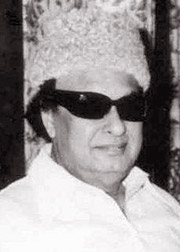Prawn cocktail across the Palk Strait
 The
recent political turbulence over developments in the waters between Sri
Lanka and India has produced some interesting information. The people of
Tamil Nadu and adjacent areas have a special liking of the ‘paraw’ fish
(blacktip trevally). They have a similar liking for prawns and sea
cucumber, while traders in other marine produce have a great interest in
conch shells. The problem is that this special liking is mainly for the
paraw, prawns, sea cucumber and conch shells found in the waters of Sri
Lanka, South of the International Maritime Boundary Line (IMBL) that
separates the Indian Ocean between spheres of control of India and Sri
Lanka. The
recent political turbulence over developments in the waters between Sri
Lanka and India has produced some interesting information. The people of
Tamil Nadu and adjacent areas have a special liking of the ‘paraw’ fish
(blacktip trevally). They have a similar liking for prawns and sea
cucumber, while traders in other marine produce have a great interest in
conch shells. The problem is that this special liking is mainly for the
paraw, prawns, sea cucumber and conch shells found in the waters of Sri
Lanka, South of the International Maritime Boundary Line (IMBL) that
separates the Indian Ocean between spheres of control of India and Sri
Lanka.
|

M Karunanadhi |

M G Ramachandran |

Joseph Vijay Chandrasekhar |
It is now evident that all the noise being made across the Palk
Strait about the threats faced buy Indian fishermen, ‘straying’ into Sri
Lankan waters is in fact a mere paraw and prawn issue. It confirms what
President Mahinda Rajapaksa told media editors earlier this week that
fishermen have a strong tendency to go after fish rather than serve the
political interests of others. He should know it because the President
has been a former Fisheries Minister too.
South Indian politics
While the politics of Tamil Nadu raises high among the waters of that
divide the two countries, with the Karunanadhi’s DMK trying to
monopolize interest in the fortunes of Tami Nadu fishermen, control over
Sri Lankan waters, where paraw and prawn are found in abundance, has
become the rallying cry of South Indian politics today.
The latest to make the political leap into these waters is the South
Indian film star Vijay, who apparently sees in these eaters the
opportunity to even beat the popularity of the late (Sri Lankan born) MG
Ramachandran in Tamil Nadu politics. At a public meeting in Nagapattinam
earlier this week, Vijay made his entry into the political fray with a
blood curdling threat to the very survival of Sri Lanka as a country.
|
Lankan waters
rich with |
* Paraw
* Prawns
* Sea cucumber
* Conch shells |
In a performance that shows more than a penchant for demagoguery,
Joseph Vijay Chandrasekhar, better known as Vijay, urged concrete action
by the Centre and TN State to end the attacks on Tamil Nadu fishermen by
the Sri Lankan Navy.
Questioning both the Central and State governments as to why they
have not taken action to stop this threat to Tamil Nadu fishermen, Vijay
uttered the dire warning: “If we retaliate Sri Lanka, which is killing
the fishermen of Tamil Nadu, Sri Lanka will not be there and Sri Lanka
will be erased in the world map”. (As reported in the ‘Malai Malar’ in
Tamil).
Sri Lankan waters
Yet amidst the political din that is increasing as Tamil Nadu state
elections draw closer, there are voices of sanity also emerging. I am
beholden to the Hindustan Times (HT) correspondent in Colombo, Sutirtho
Patranobis, for the knowledge about the taste for paraw and prawns. In
his weekly column Sleepless Nights in Sri Lanka (not surprising for an
Indian journalist here today), he says: “Tamil Nadu fishermen trespass
into Sri Lankan waters to largely poach paraw (blacktip trevally),
prawns, sea cucumber and conch shells. Last week, 136 of them became a
prized catch themselves. Lankan Tamil fishermen, in a first, intercepted
them and hauled them over to the police.”
It is now being reported that the waters closer to the Tamil Nadu
coast and above the IMBL have been depleted of stocks of these most
sought after harvest of the ocean, which drives the TN fishermen into
Sri Lankan waters. No wonder Sri Lankan fishermen now free to fish in
their own waters, fear that these waters will also soon be without
anything worth catching, as the TN fishermen come here is such large
numbers, also bringing trawlers with which they poach the deep waters,
leaving little chance for the replenishing of paraw, prawns or any other
fish around.
The HT’s Patranobis makes a very succinct observation of what is
actually taking place, away from the deafening noise of TN politics.
What’s turning out to be more serious is the frequency with which Indian
fishermen were intruding in Lankan waters, impacting the livelihood of
some 22,000 families (around 80,000 people) in Jaffna who depend on
fishing.
“They have destroyed the fishing habitat in their waters by bottom
trawling (sweeping the seabed) and now want to fish in our waters. It is
not acceptable,” Jaffna-based S Thavaratnam heading an association of
117 fishermen’s’ union, said. On Monday, fishermen wearing black bands
held a silent protest in front of the Indian Consul General’s office
there (Jaffna).
Humanitarian point of view
“Questions were being raised about the timing of the increased
incidence of incursion; suspiciously close to the Tamil Nadu assembly
elections. Attacks on or arrest of Indian fishermen could indeed a whip
up a pre-electoral frenzy along coastal constituencies, leading to more
incursions and incidents. But that could only help Sri Lanka’s new
powerful patron, who has no such bilateral issue to tackle, to tighten
its net of influence on Colombo,” he states, with a note of thinly
veiled caution to the Centre.
Accepting the reality of ‘Coalition Dharma’ as Prime Minister
Manmohan Singh admitted last week, India’s External Affairs Minister SM
Krishna, while performing the required role of supporting the political
antics of coalition ally DMK in TN, he had an important observation to
make to the Rajya Sabha last Wednesday (23).
In a good admission of reality, Krishna said: “I would also like to
point out to this August House that almost all instances of arrests and
harassment to our fishermen seems to have occurred in Sri Lankan waters,
when our fishermen stray across the International Maritime Boundary Line
(IMBL). While this by itself does not provide any justification for use
of force against our fishermen, we need to be conscious of the
sensitivities on the Sri Lankan side and of the many Sri Lankan
fishermen who have, after a long hiatus, started fishing in that area.
“Both our countries have agreed that the Joint Working Group on
Fisheries will meet in March this year. We would also encourage the
fishing associations of both countries to continue with their informal
contacts since such contacts have proved to be mutually beneficial. I
hope that, in the days to come, our countries move forward to ensure
that our fishermen can fish with safety and security.”
Palk Strait
He was echoing what President Mahinda Rajapaksa told the editors last
Tuesday, that this is an issue to be considered from a humanitarian
point of view, keeping in mind the interests of the fishermen from both
sides, as well as the overall interests of each country.
There have been welcome signs from the fishermen across the Palk
Strait who have announced a decision not to cross the IMBL and also some
good thinking by Indian officialdom to provide them with equipment such
as mobile phones to give warning signals when crossing the IMBL and
several means of demarcating the boundary.
There is also an important note of warning to politicians, including
newcomer Vijay, who seek to ride to office on the backs of the TN
fishermen. Having been used by the politicians for very long, the TN
fishermen have now realized their own political clout.
There are strong moves by organizations of fishermen to field
candidates in the coastal areas of Tamil Nadu. The possibility of being
challenged by candidates who know the true needs of fishermen has
already begin to send shivers down the spines of many who seek to use
Sri Lanka as a stepping stone to political office and power. |



